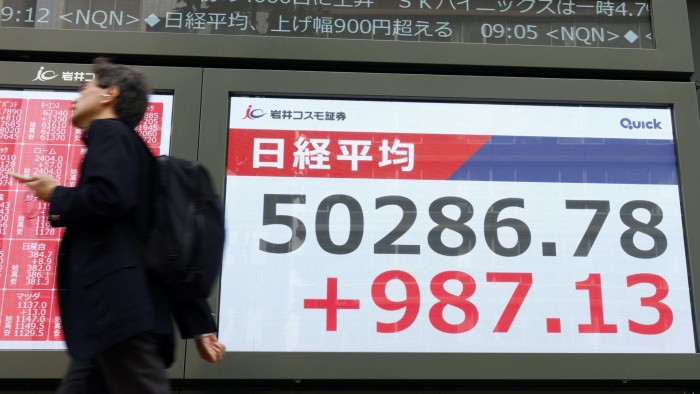Stay informed with free updates
Simply sign up to the Equities myFT Digest — delivered directly to your inbox.
Stock markets in the US and Asia hit record highs on Monday, on hopes that Donald Trump and Xi Jinping will extend a trade truce during a high-stakes meeting in South Korea this week.
The S&P 500 rose 1 per cent, and the tech-heavy Nasdaq Composite climbed 1.6 per cent. Both indices are trading at record highs at the start of a week of crucial corporate earnings and a Federal Reserve interest rate decision.
Japan’s Nikkei 225 index climbed 2.5 per cent to surge past 50,000 points for the first time. South Korea’s Kospi climbed 2.9 per cent to a record high.
China’s CSI 300 index rose 1.2 per cent, and the Hang Seng in Hong Kong gained 1.1 per cent.
The summit this week is the leaders’ first meeting since 2019, and comes after a recent flare-up in trade policy tensions saw Beijing announce sweeping export controls on rare earths, prompting Trump to threaten an extra 100 per cent tariff on China.
Following this weekend’s trade talks in Malaysia, US officials now expect China to delay the rare earths export controls. US Treasury secretary Scott Bessent said on Sunday that the US and China had agreed a “very positive” framework for the meeting, raising hopes that the two superpowers would extend their trade truce that is set to expire on November 10.
“There is some pragmatism coming back,” said Emmanuel Cau, head of European equities strategy at Barclays. “The market is getting used to looking through the noise, on the expectation that [the US and China] both need each other.”
“Still, this is good news and should add to the prevailing bullish narrative,” Cau said.
Gold prices fell 3 per cent, dipping below the recent milestone of $4,000 a troy ounce, as demand for haven assets weakened. Bitcoin extended a weekend rally, rising as much as 2.5 per cent to $116,272 earlier on Monday.
Three-month copper futures rose 0.9 per cent on the improving outlook for global growth. Signs of progress on trade talks have “boosted sentiment across the metals space”, said Daniel Hynes, senior commodity strategist at ANZ.
The encouraging US-China relations news comes ahead of a crucial week of Wall Street earnings reports, including many of the big US tech stocks which had driven this year’s market rally.
A trade truce between the two superpowers “means the AI trade and semiconductors moving across borders continues to get the green light”, said Giles Parkinson, head of equities at TrinityBridge. “It removes a gating factor on some of this AI trade.”
Shares in US chip group Nvidia rose 2.6 per cent.
In Japan, the Nikkei’s gains were also fuelled by optimism around new Prime Minister Sanae Takaichi’s growth policies.
The Nikkei, made up of blue-chip names, had performed better than the broader Topix, which includes many hundreds of small companies. The performance indicated that the rally was being driven by foreign investors, said Neil Newman, Japan equity strategist at Astris Advisory.
“I think that 60,000 by next summer is entirely doable . . . The rate that the market is moving is something we haven’t seen since the big Abenomics rally 10 years ago. It is all looking very stretched but there is real momentum,” said Newman.
Nicholas Smith, Japan equity strategist at CLSA, said: “Breaking the Big Five-Oh captures the changing of the zeitgeist: breaking 40 last year smashed the curse of the glass ceiling, but the 62 per cent rise from this year’s lows screams that, for the first time in a generation, Japan’s again a place where you can really make money.”
The Nikkei rally, led by a 7.1 per cent rise for defence manufacturer Kawasaki Heavy Industries, followed Friday’s policy speech by Takaichi in which she set out plans to stimulate economic growth and accelerate an increase in defence spending.
That announcement came ahead of Trump’s visit to Japan this week and what are expected to be strenuous efforts by Takaichi to bolster the US-Japan alliance and strike up a friendship with the American president.
US markets hit fresh records on Friday following lower-than-expected inflation numbers, underlining the likelihood of a rate cut by the Federal Reserve this week.
“You are in this environment where you see the Fed easing further when there is no recession in the US,” said Frank Benzimra, head of Asia equity strategy at Société Générale. “It has some influence on every other stock market.”
Read the full article here




